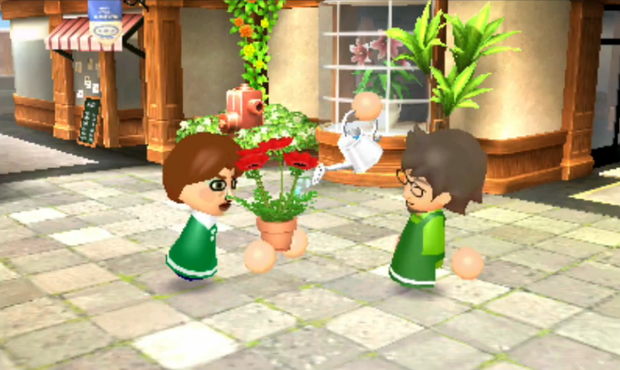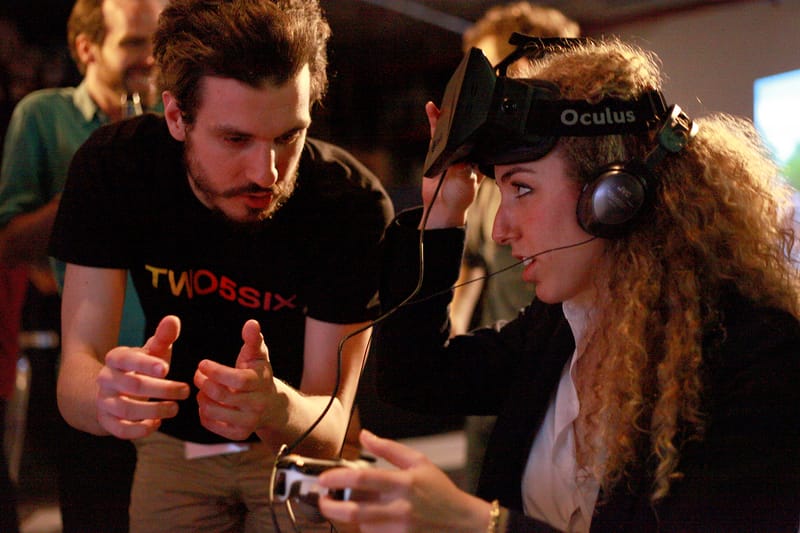When October sales are counted, the 3DS will be the top-selling piece of game hardware in the United States for the sixth month in a row. The handheld’s recovery from its dire launch over two years ago is no longer in question. Yet many still question its traditional methods in a landscape forever altered by mobile. Behind the curtain, Nintendo has pushed back against smartphone’s ubiquity in their own inimitable way.
While its glasses-less 3D screen was the 3DS’s flashiest selling point, it’s the StreetPass, which enables owners to walk by other 3DS owners out on the town and passively transmit data between each other, that makes the system markedly different from any previous device. Though Nintendo has adamantly refused to release their games on mobile platforms, StreetPass games are built on the foundation of smart device economies like microtransactions. But instead of paying currency, you’re paying in people. Money can’t buy everything, it seems. In Nintendo’s world, the richest players are those in close proximity to others playing Nintendo.
In Nintendo’s world, the richest players are those in close proximity to others playing Nintendo.
After the iPhone’s App Store opened in 2008, and games quickly become the go-to download for millions, word on the street was that dedicated handhelds were done. Even Nintendo’s president, Satoru Iwata, expressed concern over the devaluation of games in players’ eyes, quoting a report by Screen Digest stating that 92% of all apps downloaded on phones and tablets were free. What happens when we expect to pay nothing for a game?
One answer was forcing players to pay another way. The driving force of design began and ended with the money they couldn’t ask for up front; innovations focused not on the person playing and their experience but how to impede their progress. Such bottlenecks incentivize the unpaying player into paying. Mechanics are replaced with money.
Nintendo hasn’t shrugged off or ignored the newly forming model of building and selling handheld games. They’ve merely decided to work with a different currency. Where GungHo’s Puzzle & Dragons and Supercell’s Clash of Clans deal in dollars (or yen or pounds), Nintendo’s microtransactions begin and end with people.
Go into your 3DS’s StreetPass Plaza and a rabbit (holding a tablet!) will try to sell you new games beyond those installed with the system. These games–simple-on-the-surface fare like Flower Town and Monster Manor–are played by StreetPassing with other 3DS players in the real world. Progress is forged by proximity. Each game costs$5 (or $15 for all four); once bought, you never pay again. Instead of buying gems or credits to use/abuse in-game, you walk out into the world and let providence take over.

However many people carrying their 3DS you silently pass by on the street, in a coffee shop, on the subway, or in a school, you then collect them into your system. Each game uses these gathered pedestrians in various ways. In Mii Force, each becomes a weapon pod hovering around your spaceship; the more StreetPasses, the more firepower. In Warrior’s Way, the total number of people they have passed becomes recruitable soldiers who join your army. Flower Town is more passive (and the one I’ve played the most), with each person walking up to your seeded pot and watering it until it blooms.
The approach smacks of Nintendo’s philosophy since their earliest days of game design–locking away secrets in unexpected places, be it a Warp Zone behind the World 1-2 in Super Mario Bros. or a compelling game of tennis found in the swing of an arm. The 3DS’s initial hook, the one that got our attention, was born from technology, its glasses-free 3D screen. But the secret tucked away, and its surprising response to Mobile’s race-to-the-bottom mentality, is this unlocking of fellow players as chips on the table. Not everyone has money to throw at manufactured problems. In 3DS’s StreetPass games, you pay with the presence of strangers.

To their credit, many free-to-play games have lifted the “pay-to-win” bottlenecks entirely, replacing all microtransactions with cosmetic changes. Play for free, but pay $1 for this snazzy helmet! The new 3DS StreetPass games also grant such visual flourishes; certain in-game achievements earn you a ticket, which can then be redeemed for, yep, a new hat or full outfit for your Mii character. Again, people provide both the impetus and wherewithal for showing off your flair; we know those we pass daily will see our present outfit, and so we push our own style outward, a sly bit of underhanded status updating through Nintendo’s very own social network of fellow players.
The game isn’t treating price as a number to be subtracted.
(Indeed, in Iwata’s 2011 Game Developer Conference keynote, one of his slides asked, “What HAT should I wear today?” He was referring to developers in the past taking part in a wider range of tasks than today’s super-specialized roles. But I like to imagine it a clandestine tease for these unreleased games.)
The dedicated handheld is not going away. But how we pay for games might. Other 3DS experiments rely on people in a different way entirely. Instead of replacing IAPs with VIPs, a small eShop game in Japan hinges on our innate empathy toward others. Darumeshi Sports Shop is a download-only selection of baseball mini-games. Each is bought within the main game’s shop with real money. The trick here is that the price is not set; you can haggle the shop owner down, sometimes to less than half the price. Buying the game becomes the game itself.
But then Torazi, the owner, begins to explain his family situation. His wife has left him. He’s alone now, the shop his last remaining bit of livelihood, and the only way he can hope to support his ten sons. Now your cheap tactics become an impediment to another’s survival. Nevermind that Torazi is a cartoon dalmation, an animated foil with pre-programmed sayings. The game isn’t treating price as a number to be subtracted. The game requires you consider money’s other costs, emotional and otherwise. Whether Darumeshi Sports Club ever releases outside of Japan has yet to be determined. But it is this kind of human, considered approach to our industry’s more vulgar machinations that will allow games to move forward. Otherwise, we risk being buried under all those gold coins.





